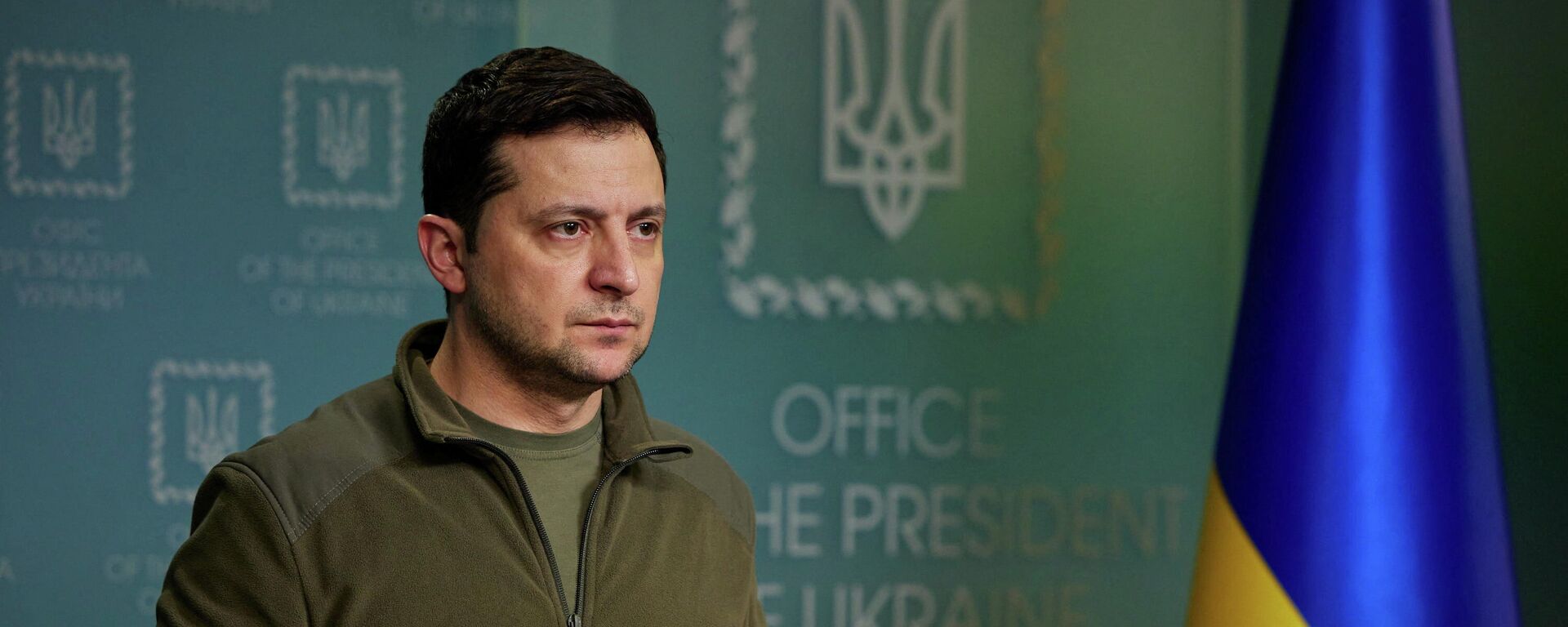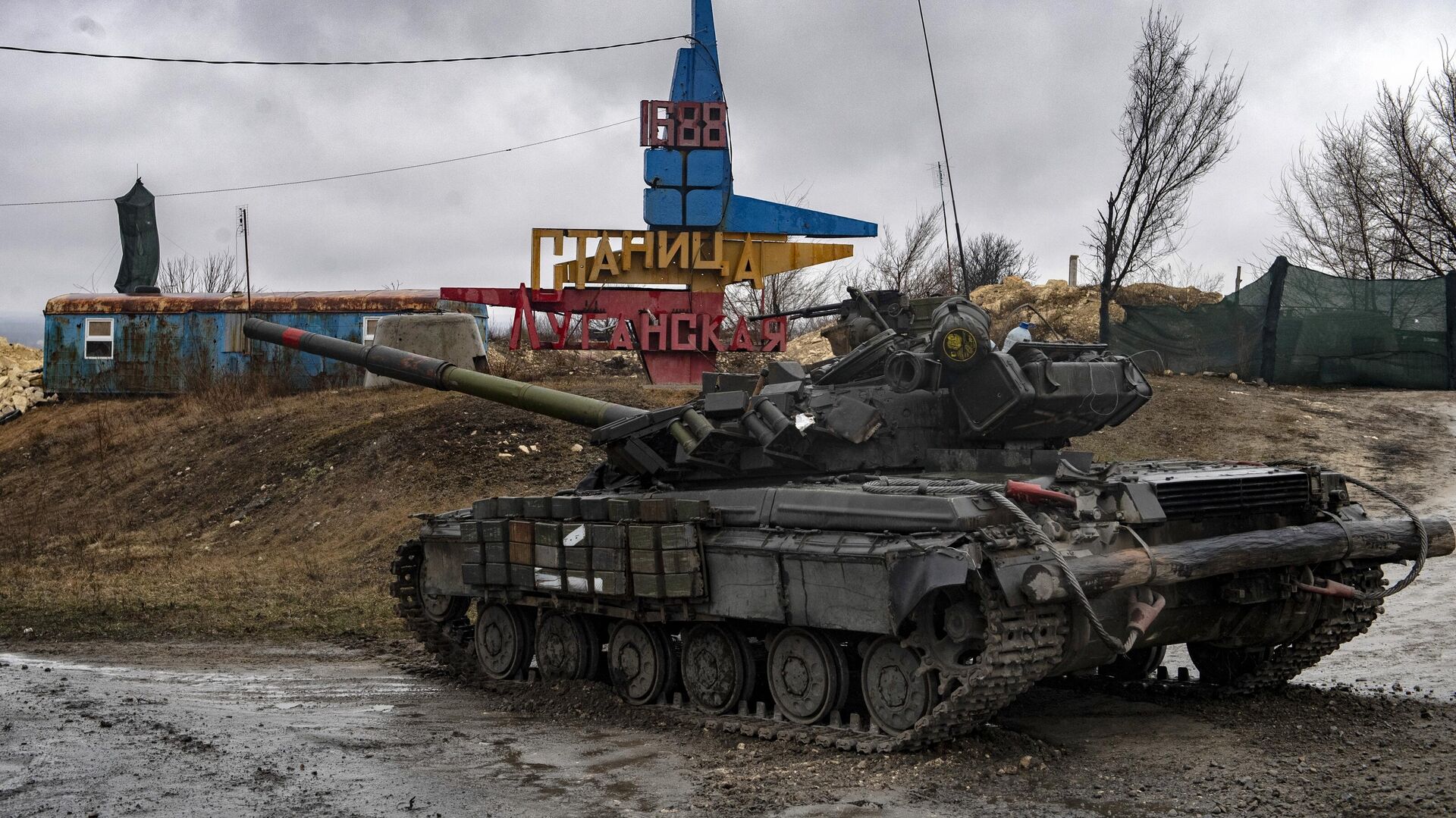https://sputnikglobe.com/20220226/putin-ordered-troops-to-stop-ukraine-op-but-it-resumed-after-kiev-refused-to-negotiate-peskov-says-1093394724.html
Kremlin: Russia Paused Military Op for Talks, but Ukraine Rejected Negotiations
Kremlin: Russia Paused Military Op for Talks, but Ukraine Rejected Negotiations
Sputnik International
Russia and its allies from the Donetsk and Lugansk People's Republics launched a military operation in Ukraine on Thursday aimed at "demilitarising and... 26.02.2022, Sputnik International
2022-02-26T12:44+0000
2022-02-26T12:44+0000
2022-02-26T18:51+0000
ukraine
russia's special operation in ukraine
https://cdn1.img.sputnikglobe.com/img/07e6/02/1a/1093395510_0:249:3199:2048_1920x0_80_0_0_f32e9aa61d580f80811057bc3e17364b.jpg
Russian President Vladimir Putin ordered a temporary halt to the Russian military operation in Ukraine on Friday afternoon in connection with the expectation of negotiations with Kiev, but the operation was resumed Saturday afternoon after the Ukrainian leadership refused to talk, Kremlin spokesman Dmitry Peskov has said.Peskov clarified that the halt in the advance did not lead to a stop in localised fighting, with hostilities continuing across a number of areas."There were clashes with mobile groups of nationalists and Banderites, who used light vehicles and trucks fitted with weapons on the principle of 'jihad mobiles,' only there they are now called 'Bandera mobiles'," the spokesman said."Banderite" is a reference to Stepan Bandera, a WWII-era Ukrainian ultranationalist and Nazi collaborator whose followers exterminated tens of thousands of Poles, Jews and Red Army troops during the war. Bandera has been lionized as a national hero by Ukraine's authorities ever since the 2014 coup in Kiev.Moscow has distinguished the Ukrainian nationalist formations from the regular Ukrainian Army, with President Putin on Friday calling on the country's military to seize power from the "gang of junkies and neo-Nazis who settled in Kiev and took the entire Ukrainian people hostage."Ukraine to 'Dictate' Peace Talks' TermsUkrainian President Volodymyr Zelensky invited Putin to "sit down at the negotiating table to stop the death of people" on Friday. The Kremlin responded with a willingness to send a delegation of high-ranking officials to Minsk, Belarus for talks. The Belarusian capital previously served as an agreed-upon neutral zone for negotiations aimed at ending the civil war in eastern Ukraine.Separately, Oleksiy Arestovich, an advisor to the head of the Ukrainian presidential administration, said that Kiev's refusal to negotiate was connected to conditions proposed by the Russian side being "unacceptable for us.""It was an attempt to force us to surrender," Arestovich said.Lukashenko Calls for Immediate TalksOn Saturday, Belarusian President Alexander Lukashenko reiterated his readiness to immediately provide Russia and Ukraine with a platform for peace talks.Lukashenko said he proposed talks in Minsk from day one of the fighting. "Vladimir Putin called me and said...Well, various games are being played over there. Some want [talks in] Warsaw and some [in] America. Listen, Kiev is virtually surrounded while they keep prating. People are dying while they keep prating." The Belarusian president went on to accuse some foreign actors of encouraging and "pushing" Kiev to keep fighting, and promising aid in the form of fighters from Afghanistan, the Middle East and private military companies. "These are professional warriors, professional killers. And if they get involved, you can imagine what will happen in Ukraine," he said.On Thursday morning, Russian, Donetsk, and Lugansk People's Republic forces launched what Putin characterised as a "special military operation" in Ukraine aimed at "demilitarising and denazifying" the country. The move came after the continued escalation of back and forth shelling and mortar attacks in the Donbass, despite Russia's move to recognise the sovereignty of the DPR and LPR last Monday.The US and its allies condemned the Russian-led operation as an out of the blue and unprovoked "act of aggression" and "invasion," slapping Moscow with new sanctions and promising to send more military aid to Ukraine.The current situation is the culmination of a political, economic and security crisis, which began in February 2014 when Ukraine's unpopular but democratically elected government was overthrown in a US- and EU-backed coup by forces seeking to integrate the country into the Western economic and military blocs. In January, NATO Secretary-General Jens Stoltenberg announced that Ukraine's entry into NATO was a done deal, and merely a question of timing. A month earlier, Moscow sent the US and NATO a pair of security proposals beseeching Washington and the alliance to keep Ukrainian membership in the bloc off the table.
https://sputnikglobe.com/20220225/zelensky-invites-putin-to-negotiation-table-1093365492.html
ukraine
Sputnik International
feedback@sputniknews.com
+74956456601
MIA „Rossiya Segodnya“
2022
News
en_EN
Sputnik International
feedback@sputniknews.com
+74956456601
MIA „Rossiya Segodnya“
Sputnik International
feedback@sputniknews.com
+74956456601
MIA „Rossiya Segodnya“
ukraine
Kremlin: Russia Paused Military Op for Talks, but Ukraine Rejected Negotiations
12:44 GMT 26.02.2022 (Updated: 18:51 GMT 26.02.2022) Russia and its allies from the Donetsk and Lugansk People's Republics launched a military operation in Ukraine on Thursday aimed at "demilitarising and denazifying" the country in the face of a security crisis of a scale unseen in Europe in decades.
Russian President Vladimir Putin ordered a temporary halt to the Russian military operation in Ukraine on Friday afternoon in connection with the expectation of negotiations with Kiev, but the operation was resumed Saturday afternoon after the Ukrainian leadership refused to talk, Kremlin spokesman Dmitry Peskov has said.
"Yesterday afternoon, in connection with the expected negotiations with the Ukrainian leadership, the Russian president and supreme commander ordered the suspension of the advance of the main forces," Peskov said, speaking to reporters on Saturday. "Since the Ukrainian side essentially refused to negotiate, the advance of the main Russian forces resumed this afternoon in accordance with the operational plan," he added.
Peskov clarified that the halt in the advance did not lead to a stop in localised fighting, with hostilities continuing across a number of areas.
"There were clashes with mobile groups of nationalists and Banderites, who used light vehicles and trucks fitted with weapons on the principle of 'jihad mobiles,' only there they are now called 'Bandera mobiles'," the spokesman said.
"Banderite" is a reference to Stepan Bandera, a
WWII-era Ukrainian ultranationalist and Nazi collaborator whose followers exterminated tens of thousands of Poles, Jews and Red Army troops during the war. Bandera has been lionized as a national hero by Ukraine's authorities ever since the 2014 coup in Kiev.
Moscow has distinguished the Ukrainian nationalist formations from the regular Ukrainian Army, with President Putin on Friday
calling on the country's military to seize power from the "gang of junkies and neo-Nazis who settled in Kiev and took the entire Ukrainian people hostage."
Ukraine to 'Dictate' Peace Talks' Terms
Ukrainian President Volodymyr Zelensky
invited Putin to "sit down at the negotiating table to stop the death of people" on Friday. The Kremlin
responded with a willingness to send a delegation of high-ranking officials to Minsk, Belarus for talks. The Belarusian capital previously served as an agreed-upon neutral zone for negotiations aimed at ending the civil war in eastern Ukraine.

25 February 2022, 11:26 GMT
However, on Saturday, Ukrainian presidential advisor Mikhail Podolyak said that Kiev has rejected negotiations with Russia for the time being because the conditions were not right. "Any war ends with a negotiation process, but I think that the positions in this negotiations process will be different. These will be positions that Ukraine will dictate. It will set the conditions for what will happen next, including in the Donetsk and Lugansk regions," Podolyak said.
Separately, Oleksiy Arestovich, an advisor to the head of the Ukrainian presidential administration, said that Kiev's refusal to negotiate was connected to conditions proposed by the Russian side being "unacceptable for us."
"It was an attempt to force us to surrender," Arestovich said.
Lukashenko Calls for Immediate Talks
On Saturday, Belarusian President Alexander Lukashenko reiterated his readiness to immediately provide Russia and Ukraine with a platform for peace talks.
"We are open. They can come today. We will provide everything needed and help in this regard to prevent a war and slaughter. It is still a conflict for now, a conflict in the inflammation stage. It has to be stopped. You know our stance. I spoke about it on the first day," Lukashenko said.
Lukashenko said he proposed talks in Minsk from day one of the fighting. "Vladimir Putin called me and said...Well, various games are being played over there. Some want [talks in] Warsaw and some [in] America. Listen, Kiev is virtually surrounded while they keep prating. People are dying while they keep prating."
The Belarusian president went on to accuse some foreign actors of encouraging and "pushing" Kiev to keep fighting, and promising aid in the form of fighters from Afghanistan, the Middle East and private military companies. "These are professional warriors, professional killers. And if they get involved, you can imagine what will happen in Ukraine," he said.
On Thursday morning, Russian, Donetsk, and Lugansk People's Republic forces launched what Putin characterised as a "special military operation" in Ukraine aimed at "demilitarising and denazifying" the country. The move came after the continued escalation of back and forth shelling and mortar attacks in the Donbass, despite Russia's move to recognise the sovereignty of the DPR and LPR last Monday.
The US and its allies condemned the Russian-led operation as an out of the blue and unprovoked "act of aggression" and "invasion," slapping Moscow with new sanctions and promising to send more military aid to Ukraine.
The current situation is the culmination of a political, economic and security crisis, which began in February 2014 when Ukraine's unpopular but democratically elected government was overthrown in a US- and EU-backed coup by forces seeking to integrate the country into the Western economic and military blocs. In January, NATO Secretary-General Jens Stoltenberg
announced that Ukraine's entry into NATO was a done deal, and merely a question of timing. A month earlier, Moscow sent the US and NATO a pair of security proposals beseeching Washington and the alliance to keep Ukrainian membership in the bloc off the table.



